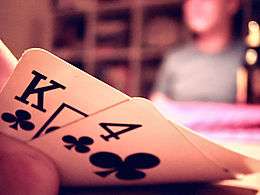Perfect information
In economics, perfect information is a feature of perfect competition. With perfect information in a market, all consumers and producers are assumed to have perfect knowledge of price, utility, quality and production methods of products, when theorizing the systems of free markets, and effects of financial policies.
In game theory, an extensive-form game has perfect information if each player, when making any decision, is perfectly informed of all the events that have previously occurred, including the "initialization event" of the game (e.g. the starting hands of each player in a card game).[1]
Perfect information is importantly different from complete information, which implies common knowledge of each player's utility functions, payoffs, strategies and "types". A game with perfect information may or may not have complete information, and vice versa; however, when a game is described as having perfect information, complete information is often assumed, unless specified otherwise.
Examples


Chess is an example of a game with perfect information as each player can ostensibly see all of the pieces on the board at all times. Other examples of perfect games include tic-tac-toe, Irensei, and Go. The formal definition can be easily extended to include games with exogenous uncertainty from chance events, such as in backgammon, or simultaneous move games, such as in the iterated prisoner's dilemma, or both, such as in Goofspiel.
Card games where each player's cards are hidden from other players, as in contract bridge and poker, are examples of games with imperfect information.[2][3]
See also
- Complete information
- Extensive form game
- Information asymmetry
- Partial knowledge
- Perfect competition
- Screening game
- Signaling game
References
- ↑ Osborne, M. J.; Rubinstein, A. (1994). "Chapter 6: Extensive Games with Perfect Information". A Course in Game Theory. Cambridge M.A.: The MIT Press. ISBN 0-262-65040-1.
- ↑ Thomas, L. C. (2003). Games, Theory and Applications. Mineola N.Y.: Dover Publications. p. 19. ISBN 0-486-43237-8.
- ↑ Osborne, M. J.; Rubinstein, A. (1994). "Chapter 11: Extensive Games with Imperfect Information". A Course in Game Theory. Cambridge M.A.: The MIT Press. ISBN 0-262-65040-1.
Further reading
- Fudenberg, D. and Tirole, J. (1993) Game Theory, MIT Press. (see Chapter 3, sect 2.2)
- Gibbons, R. (1992) A primer in game theory, Harvester-Wheatsheaf. (see Chapter 2)
- Luce, R.D. and Raiffa, H. (1957) Games and Decisions: Introduction and Critical Survey, Wiley & Sons (see Chapter 3, section 2)
- The Economics of Groundhog Day by economist D.W. MacKenzie, using the 1993 film Groundhog Day to argue that perfect information, and therefore perfect competition, is impossible.